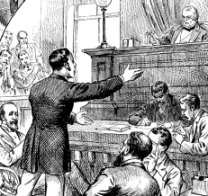The Speedy Trial Clause
The 6th Amendment's Speedy Trial Clause guarantees that if you are
accused of a crime, you will be tried quickly. This clause
was added to the Bill of Rights by the Founding Fathers to protect
people from lengthy periods of incarceration before they were found
guilty of a crime. This was a well established part of English Common
Law even before the colonization of America.
The Speedy Trial Clause reads like this:
"In all criminal prosecutions, the accused shall enjoy the right to a speedy... trial."
Speedy Trial Clause Purpose
The Speedy Trial Clause is meant to accomplish three primary things,
according to the Supreme Court:
- To prevent a lengthy period of incarceration before a trial. This would amount to a detention without having been tried and convicted.
- To minimize anxiety and concern related to a public accusation. If someone was actually found innocent, all of their suffering would have been uncalled for.
- To minimize the possibility that a long delay would impair the accused's ability to defend himself due to fading memories or the death of witnesses, for example.
The Speedy Trial Clause also serves several public interests, apart
from the interests of the accused. The public pays great expense to
house someone while they are incarcerated. If the person is actually
guilty and he is out on bail, he could commit another
crime before the trial. He could also be tempted to run if the
pre-trial period is very long or be able to finagle a lesser charge or
sentence.
History of the Speedy Trial Clause
The idea that the government cannot imprison people without giving them
access to a review by a court goes back far into English history. The
Assize of Clarendon of 1166 and the Magna Carta of 1215 both touch on this. The English
Habeas Corpus Act of 1679 required speedy hearings when the
accused person was out on bail. The intention was to prevent a lengthy
period of incarceration before a trial and guilty verdict.

The right to a speedy trial became a bedrock principle of English
common law that was carried to America by the colonists. After the
Revolutionary War, the Founding Fathers wrote a new constitution to
govern themselves. As the Constitution of the United States was being
discussed, many people felt that it did not provide strong enough
protections for many individual rights from the government. These
people threatened to reject the Constitution unless a Bill of Rights
was added to it. A Bill of Rights is a list of specific rights that the
government cannot infringe upon.
In order to secure the agreement of these people, the First Congress
voted to add a Bill of Rights to the Constitution. James Madison
proposed twenty amendments to the Congress on June 8, 1789. The right
to a speedy trial was one of them. The idea of the right to a speedy
trial was so universal among the Founders that it was approved without
a word of discussion about it. You
can read Madison's June 8 speech to Congress here.
The Congress approved twelve amendments and sent them to the states for
ratification. The states approved ten of these, which are now known as
the Bill of Rights. The Speedy Trial Clause and the other parts of the
first ten amendments became law on December 15, 1791. You
can read more about the Purpose of the Bill of Rights here.
Speedy Trial Clause in Everyday Life

The right to a speedy trial officially begins when a person is arrested
or indicted by a grand jury, not when an investigation begins. The
Federal Speedy Trial Act of 1974 defines the time frame in which a
criminal trial must begin. Generally, charges must be filed within 30
days of an arrest and a trial must commence within seventy days of the
charges being filed.
For most violations of a criminal defendant's constitutional rights, a
new trial is ordered. For a 6th Amendment Speedy Trial violation,
however, new trials are not allowed. If a Speedy Trial violation
has occurred, the conviction will be thrown out
without a possibility of retrial.
Courts very rarely find Speedy Trial violations for this reason.
They do not like the possibility that someone who is guilty could go
free. For this reason, the Supreme Court gives lower courts very broad
discretion in judging speedy trial violation claims. Even delays of up
to several years before there is a trial are often not considered to be
Speedy Trial Clause violations by the court.
Originally, as with all the restrictions upon the government in the US
Bill of Rights, the 6th Amendment's Speedy Trial Clause only applied to
the Federal government. After the Civil War, and the adoption of the
14th Amendment, the courts have applied almost all parts of the Bill of
Rights, including the Speedy Trial Clause, to the states as well,
through the 14th Amendment's Due Process Clause. You
can read the 14th Amendment here.
Charges can be dismissed by a court if there has been too long a delay
before a trial. In some jurisdictions, the length of time between
charges being filed and the date the trial must begin, is defined by
statute. In other cases, a court can dismiss charges with a subjective
reviewing of the facts.
If a person fails to make a claim that his 6th Amendment right to a
speedy trial has been violated before a trial or guilty plea, the
defendant may lose his right to make this claim, especially if the
delay has benefited him somehow.
You
can read about several interesting and significant Sixth Amendment
Court Cases dealing with the Speedy Trial Clause here.
Return
to 6th Amendment
Other 6th Amendment clauses:
Public
Trial Clause
Right
to Trial by Jury Clause
Arraignment Clause
Confrontation Clause
Compulsory
Process Clause
Right
to Counsel Clause
Amendments:
Preamble
to the Bill of Rights
Learn
about the 1st Amendment here.
Learn
about the 2nd Amendment here.
Learn
about the 3rd Amendment here.
Learn
about the 4th Amendment here.
Learn
about the 5th Amendment here.
Learn
about the 6th Amendment here.
Learn
about the 7th Amendment here.
Learn
about the 8th Amendment here.
Learn
about the 9th Amendment here.
Learn
about the 10th Amendment here.
Read
the Bill of Rights here.
Return to 6th Amendment
Return to Main Bill of Rights page
Revolutionary War and Beyond Home
Like This Page?
© 2008 - 2022 Revolutionary-War-and-Beyond.com Dan & Jax Bubis










Facebook Comments